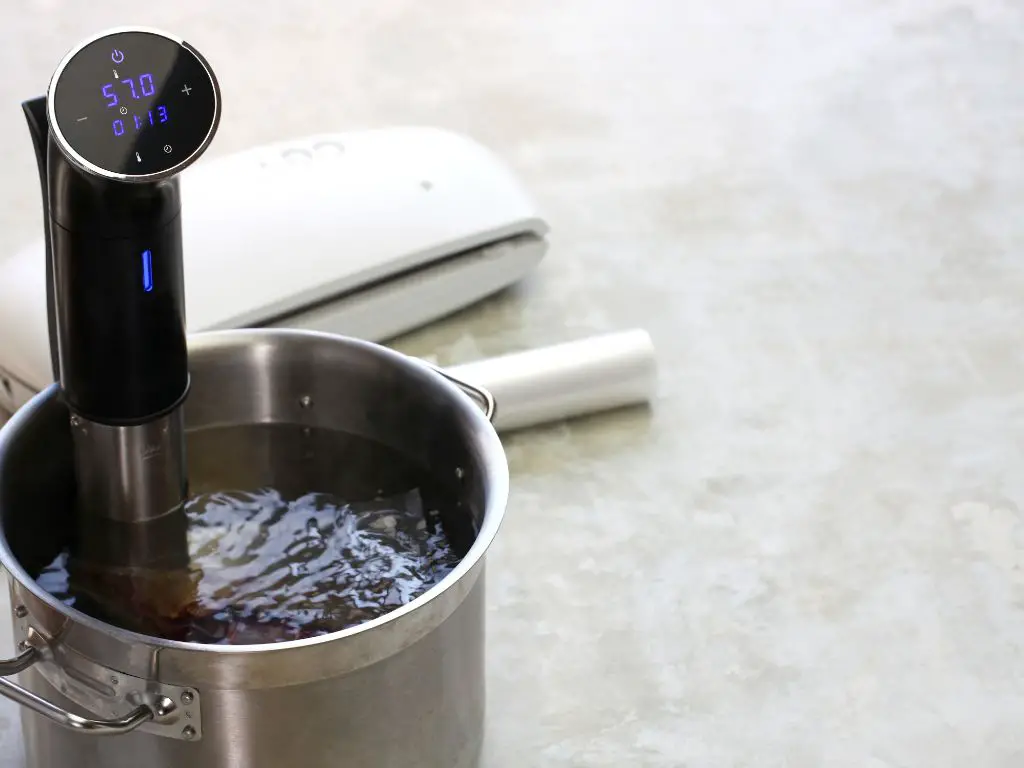Sous vide cooking has become an increasingly popular technique for perfectly cooking meats, vegetables, and other foods. With this method, food is vacuum sealed in plastic bags and then submerged in temperature-controlled water for long periods of time. However, a common frustration when cooking sous vide is dealing with floating bags.
Floating sous vide bags can negatively impact the cooking process and final results. That’s why it’s important to understand the reasons why bags float during sous vide cooking and utilize methods to prevent it. In this article, we’ll cover:

Sous Vide Products I Use Every Day
As an Amazon affiliate, I earn from qualifying purchases.
Last update on 2025-03-03 / Affiliate links / Images from Amazon Product Advertising API
Why Do Sous Vide Bags Float?
There are a few key reasons why you may encounter floating sous vide bags:
Air Trapped in the Bag
One of the main culprits of buoyant sous vide bags is excess air that gets trapped inside the bag. When food is vacuum sealed, not all the air gets removed. The remaining air causes the bag to become buoyant and float to the top of the water. Vacuum sealers don’t remove 100% of air.
Low-Density Foods
Some foods like vegetables and fruits naturally have a lower density than water. When sealed in a bag with minimal air, the overall density of the bag and its contents is lower than that of water, causing it to float. Food density plays a key role.
Improper Sealing
Bags that are not properly vacuum sealed and still contain a large volume of air are very likely to float. Improper seals or sealing techniques allow excess air to remain in the bag and contribute to buoyancy.
Uneven Weight Distribution
If the contents of the sous vide bag are not distributed evenly, this can cause one end of the bag to become more buoyant and tilt upwards. Uneven weight inside the bag makes floating more likely.
Tips to Prevent Sous Vide Bags from Floating
Luckily, there are several effective techniques you can use to prevent or fix floating sous vide bags:
Properly Seal the Bag
Ensuring you properly vacuum seal bags is one of the best ways to prevent excess air. Use a good vacuum sealer and seal the bag on the moist setting to remove the most air possible before cooking.
Remove Excess Air
After sealing the bag, you can try to force out any remaining air bubbles by gently pressing the bag and moving the air pocket toward the top before fully sealing. Removing air pockets helps reduce buoyancy.
Use a Sous Vide Rack or Weight
Securing bags underwater with a rack or weighting them down with something like a ziplock bag filled with water works very well. The sous vide rack or weight keeps the bags fully submerged.
Use a Sous Vide Clip
Special sous vide clips are available that clip onto the top of bags and attach them to the side of stock pots, helping submerge them. The clips hold bags under the water.
Choose the Right Type of Bag
Opt for thicker, high quality sous vide bags rather than cheaper, thinner bags which are more prone to floating. Thicker bags also reduce risk of leaks.
Pre-sear or Blanch Certain Foods
Pre-searing meats or blanching vegetables before sealing them for sous vide can help remove internal air pockets that lead to floating. This pre-cooking step reduces buoyancy.
Adjust Cooking Temperature and Time
For foods like vegetables, lowering the water cooking temperature slightly while extending the cook time can help tenderize the food and make the bag less buoyant.
Conclusion: Importance of Preventing Floating Bags in Sous Vide Cooking
Dealing with floating bags when cooking sous vide can be annoying, but preventing it is important for ensuring even cooking and food safety. Submerging bags in the water bath ensures the food cooks properly at the precise temperature. Floating bags can lead to uneven cooking results.
Implementing methods like vacuum sealing, weighting bags, securing with racks, and choosing good quality bags will help prevent frustration and make sous vide cooking easier. With a few simple techniques, you can avoid floating sous vide bags.


![IMPRESA [10 Pack] Sous Vide Magnet Weights for Keeping Bags Submerged – Sous Vide Accessories to Stop Floating Bags & Undercooking – Weighted Magnets for Containers](https://m.media-amazon.com/images/I/41zHpl8G2lL._SL160_.jpg)

